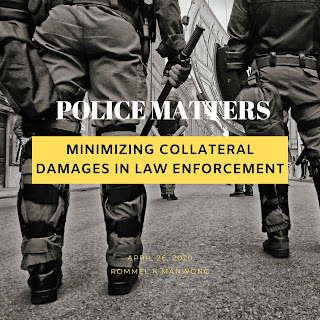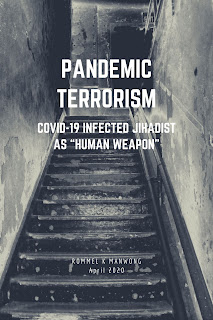By: Rommel K Manwong
LEAPS Academy Philippines| Insights
Law Enforcement Studies | Applied Criminology
It has been nearly a week since
the shooting incident involving a policeman killing an ex-army personnel in Quezon
City during the implementation of the Enhanced Community Quarantine (ECQ), as a
measure to control the spread of COVID-19. Luzon and many parts of the country
has been under a state of lockdown for almost two months due to the coronavirus
pandemic. And while the economy is going down there are other collateral
damages we are incurring - we are losing people in the front line.
The past days have been so intense
in terms of exchanges of public views, legal opinions, and “expert analysis” on
the shooting incident issue. This goes to the extent that some people tried to
create a belligerent scenario between the police (PNP) and the military (AFP).
Alas, this thing happened – a collateral
loss in our battle against the dreaded disease. Nevertheless, we still give respect,
and we salute all personnel of the PNP and the AFP as front liners in fighting the
unseen enemy. Honoring the fallen hero Army Corporal Winston Ragos is dignified
and decorous of his being a Marawi war veteran. On the other hand, giving Police
Master Sergeant Daniel Florendo Jr a fair trial in his case is expected and extremely
appropriate. A sober public is hereby called upon to show empathy rather that
creating friction among our comrades in the armed services. We have to put
things into proper perspectives. Both individuals are victims of unfortunate circumstance
being on the spot in a wrong time at the wrong place.
Sometimes, it is simply so difficult
to handle public opinion because of individual cognitive biases. But this kind
of incident is not new. There were many instances in the past where a law
enforcer is on the blink of judgment whether to shoot or not to shoot a suspect.
In criminology schools, we teach that this is part of law enforcement, it is a
common dilemma to manage, it is one of the dynamics in policing, in the same
manner that friendly firing happens in military operations, where the victim is
one of their own or an attack has made by a military force on friendly or
neutral troops while attempting to attack an enemy. In such instances, the
absence of considerations of damage control measures tends to malign and kick a
blow on both the individuals involved and their respective organizations.
Situational Awareness is Key
to Operational Success
In law enforcement, shit happens.
And so, with military operations. There are no perfect tactics because circumstances
vary; therefore, decisions vary. This is why appropriate training and
indoctrination is significant from the beginning of entry of personnel to any armed
services. Although this is already a given proposition, but the PNP and AFP
should constantly review, assess, and exercise prudence in applying rules of
engagement and or police operational procedures.
Our policemen
must keep their cool and continue to be mindful that situational awareness is
key to police operational success. Thinking back that without situational
awareness, officers run the danger of endangering their colleagues, themselves
and the public. Policemen on the ground must remember their indoctrination
about the application of Jeff Cooper’s Color Code and John Boyd’s OODA loop.
All these have been taught in the training school. There have been series of exercises
made on these tools. Rehearsal is now over; it is application in the policeman’s
hand.
As we always advocate “operational success in limiting the collateral damage would depend on the level of situational awareness of the people on the ground and their reaction speed.”
Consciousness on the Code of
Conduct and the Ethical Standards
Planting of evidence is never
taught, never allowed, and is a grave violation of law. Every police officer knows
they have a law enforcement code of conduct. Policemen even memorized their
ethical standards as they taught and encouraged (if not being forced) to do so
in school during training days. In reality, the practice and application of
these sets of human conduct will shield them away from unwanted actions and
reactions against them, and to ensure that every police officer is aware of
their individual responsibilities to maintain their own integrity, and that of
their agency, and to the people they serve. As a fact, it is all stated in this
line “As a police officer, my fundamental duty is to serve mankind, to
safeguard lives and property; to protect the innocent against deception, the
weak against oppression or intimidation, and the peaceful against violence or
disorder; and to respect the Constitutional rights of all men to liberty,
equality and justice.”
Introduction of other Non-lethal
Weapons
As expected, the “use of force” is
an issue that goes controversial all the time. Even from the views of lawyers
and judges, there are different interpretations, and perhaps again, the human
nature of cognitive bias is in action. Criminological studies have proven that in
making an arrest, use of force is almost involved, and injuries to civilians is
of high percentage. So, in order minimize deadly police actions in the
enforcement of the laws, less-lethal weaponry can be utilized such as Pepper Spray,
and conducted energy devices such as the Tasers. But technology and equipment
are only as good as the users. With minor adjustments some equipment and or
technology would turn into a formidable necessity for handling life impacting
threats. Besides, some users could get even more benefit out of the technology and
equipment than others. Subsequently, skills must be relevant to the threat. Soft
skills are just as important as hard skills. Training continues to be as
significant as ever.
Understanding Behavioral Patterns
Policemen are supposedly prepared
to understand and recognize dangerous behavior. Part of their situational awareness
training is a critical situation analysis where they can observe and exploit human
actions that does not fit with the expectation of the situation, and to help
them make the right quick decision. This can either “make” or “break” an
officer at one time a deadly move is caused by not considering this important factor.
Tactical Edge in Public Service
Policing is a public service. It
is natural for policemen to deal with people in the street or anywhere where
their attention is called upon. Tactically speaking, when they deal with people
in the street, they need to maintain distance and create space, and be ready to
make quick response to any kind of physical menace. Policemen are not prepared
to inspire a response that would call for aggressive conduct. On this matter, exercising
prudence is not an option but compulsory. However, for prudence to be applied
and carried out well, constant practice is a must.
***
For other related insights, kindly check them here:
https://www.pccmleaps.org/blog or here









